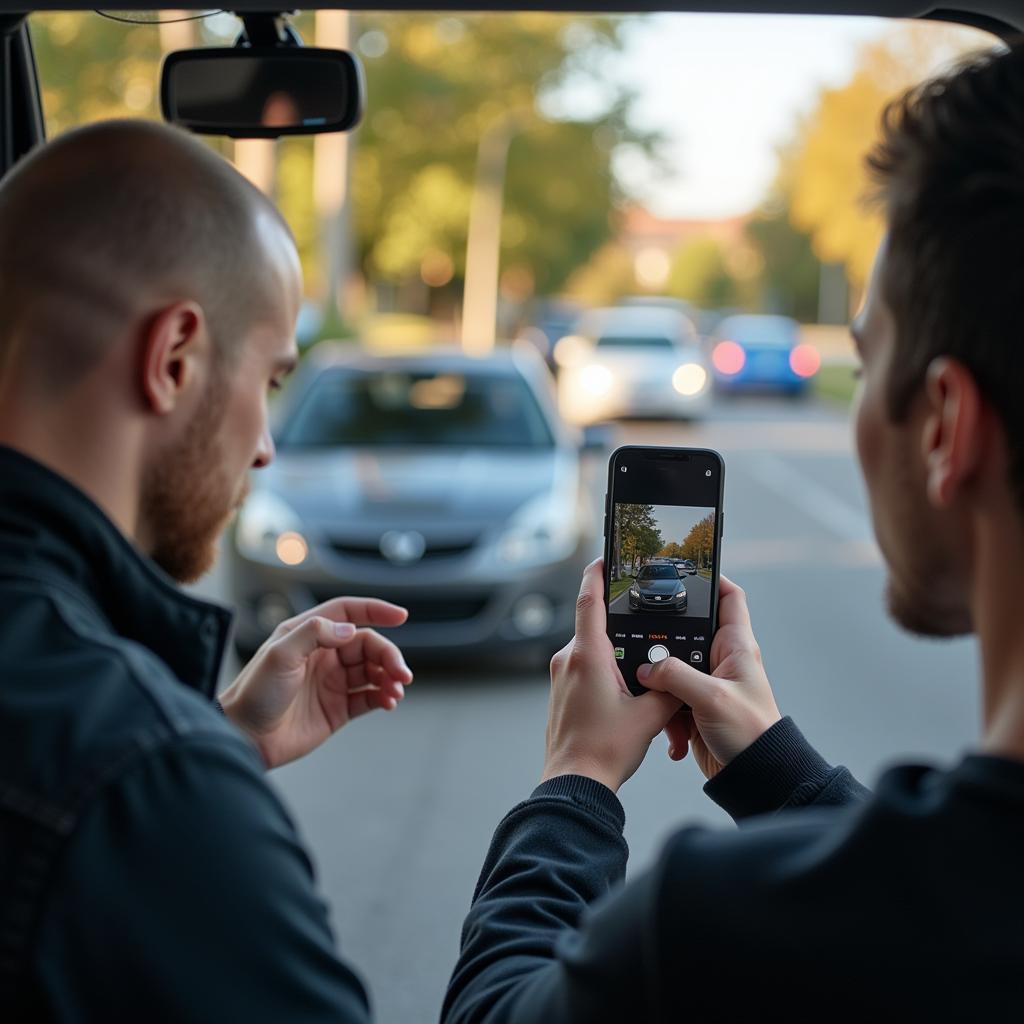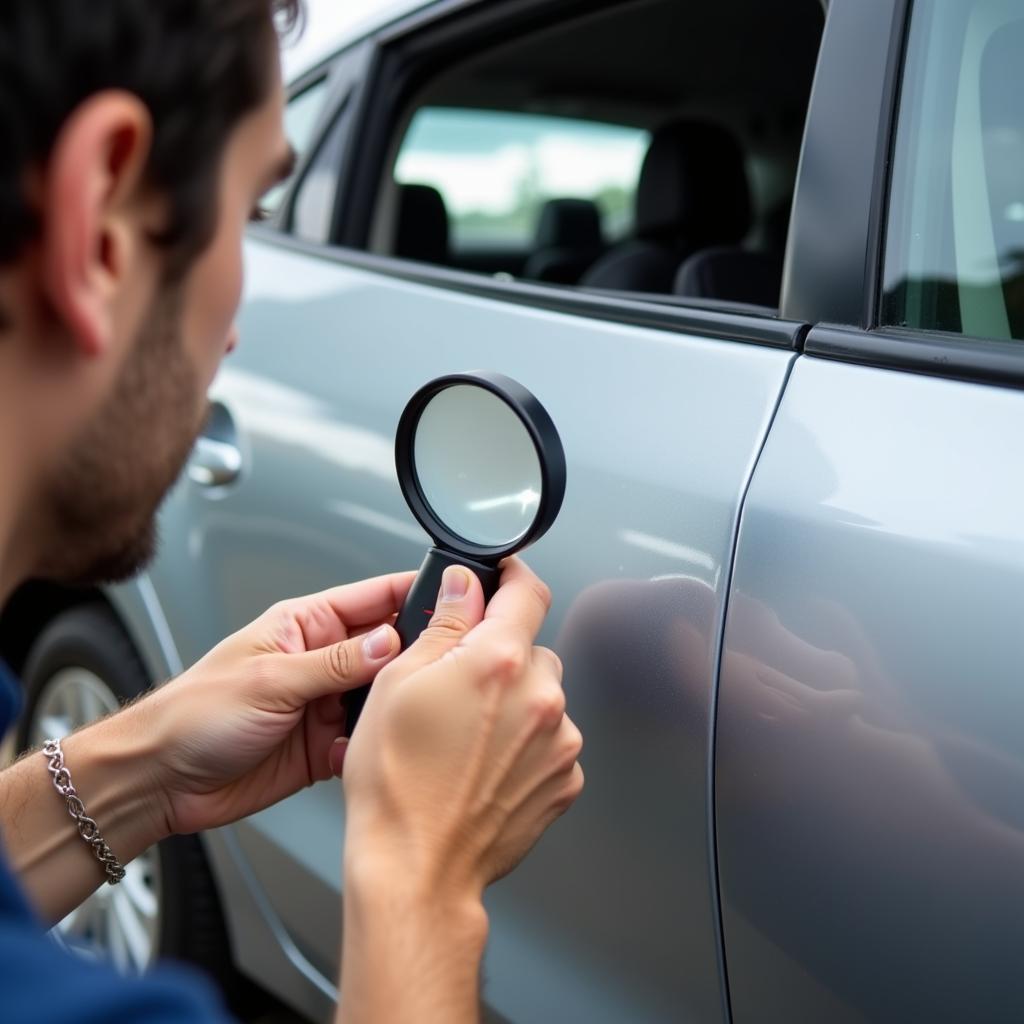When you discover a scratch on your car, one of the first questions that pops into your head might be, “Do You Have To Exchange Insurance Details Scratched Car?” The answer, like so many legal matters, isn’t a simple yes or no. It depends on a variety of factors, including the severity of the damage, the location of the incident, and the willingness of the parties involved. Let’s delve into the specifics to help you navigate this often confusing situation.
Understanding the Legal Requirements for Exchanging Insurance Information
In many jurisdictions, there’s a legal obligation to exchange insurance details after a road traffic accident that results in damage or injury. However, a minor scratch might fall into a gray area. While exchanging information is always the best practice, it’s not always legally mandated for very minor damage where no other vehicle is involved, like scraping against a wall. The key here is to understand the difference between legal requirements and best practices.
When Exchanging Insurance is Necessary
There are several scenarios where exchanging insurance information is crucial:
- Significant damage: If the scratch is deep, goes through the paint to the metal, or affects a large area of the car, exchanging insurance is highly recommended.
- Another vehicle involved: If the scratch occurred due to contact with another vehicle, even if it seems minor, you should absolutely exchange insurance details with the other driver. This protects you from potential disputes later.
- Public property damage: If you scratched a parked car or public property, leaving a note with your contact and insurance information is essential.
- Injuries involved: If anyone is injured, regardless of how minor the scratch appears, exchanging insurance details is crucial.
 Exchanging Insurance After a Car Scratch Incident
Exchanging Insurance After a Car Scratch Incident
When Exchanging Information Might Not Be Legally Required
For incredibly minor scratches, like a light scuff that can be easily buffed out, exchanging insurance details might not be legally required, especially if only your vehicle is involved. However, documenting the damage with photos is always a wise move.
What Information Should You Exchange?
If you decide to exchange information, ensure you gather the following:
- Full name and address
- Insurance company name and policy number
- Driver’s license number
- Vehicle registration number
- Contact phone number
Make sure to also take photos of the damage, the surrounding area, and the other vehicle (if applicable).
What if the Other Driver Refuses to Exchange Information?
If the other driver refuses to cooperate, try to remain calm and gather as much information as possible. Note their license plate number, vehicle description, and any identifying features. If possible, take photos or videos of the driver and their vehicle. Contact the police and report the incident, providing them with the information you’ve collected.
 Dealing with an Uncooperative Driver After a Scratch
Dealing with an Uncooperative Driver After a Scratch
Expert Insight:
“In my experience, even minor scratches can lead to significant repair costs. Exchanging insurance information is always the safest route, even if it’s not legally required. It protects you from potential liability and ensures a smoother claims process,” says Peter Ashton, Lead Automotive Claims Assessor at Assured Claims UK.
Handling the Claim Process
Once you’ve exchanged information, contact your insurance company as soon as possible to report the incident. Provide them with all the details you’ve gathered, including photos and witness information if available. Your insurer will guide you through the claims process.
Do You Have to Go Through Insurance for a Scratched Car?
You aren’t always obligated to go through insurance for a minor scratch, particularly if it’s just your car and the damage is cosmetic. You could choose to pay for repairs out of pocket, especially if the cost is less than your deductible.
 Assessing Minor Car Scratch Damage
Assessing Minor Car Scratch Damage
Expert Insight:
“Sometimes, paying for a minor repair out of pocket can be more cost-effective than filing an insurance claim, particularly if it might affect your premiums in the future. Weigh your options carefully and consult with your insurer to make the best decision,” advises Sarah Mitchell, Senior Insurance Broker at AutoShield Insurance.
Conclusion
So, do you have to exchange insurance details scratched car? The answer is nuanced. While not always legally mandatory for very minor damage, it’s always the best practice. Exchanging information protects you from disputes, simplifies the claims process, and ensures you’re covered if the damage is more extensive than initially thought. Documenting the incident thoroughly, regardless of the severity, is key to protecting yourself. For further assistance or clarification, don’t hesitate to reach out to us via WhatsApp: +1(641)206-8880, or Email: [email protected]. Our 24/7 customer support team is here to help.
FAQ
- What if I can’t find the owner of the car I scratched?
- Should I report a scratch even if I plan to pay for the repairs myself?
- What if the other driver is uninsured?
- Will my insurance premium increase after a scratch claim?
- How long do I have to report a scratch to my insurance company?
- What if I disagree with the other driver about who is at fault?
- Can I claim for a scratched car on my insurance if I don’t know who did it?
For more information related to car detailing and maintenance, check out these articles:
- “Protecting Your Car’s Paint: A Comprehensive Guide”
- “DIY Car Scratch Repair: Tips and Tricks”
- “Understanding Your Car Insurance Policy”
Need help with car detailing or diagnostics? Contact us on WhatsApp: +1(641)206-8880, Email: [email protected]. We have a 24/7 customer support team ready to assist.

Leave a Reply